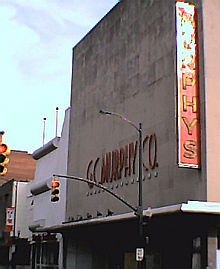 | |
 G.C. Murphy's Richmond, Virginia, store on Broad Street and Fourth was designed by Murphy corporate architect Harold Ellsworth Crosby. In 2004, it was demolished to make way for a parking lot. | |
| Industry | 5&10 Variety Stores |
|---|---|
| Founded | 1906 |
| Founder | George Clinton Murphy |
| Defunct | 2002 |
| Fate | Acquired by Ames, later McCrory |
| Headquarters | McKeesport, Pennsylvania |
Number of locations | 298 (1989) |
| Subsidiaries | Bargain World, Terry and Ferris, Bruners, Cobbs |
G.C. Murphy was a chain of five and dime or variety stores in the United States from 1906 to 2002. They also operated Murphy's Mart (full-scale discount stores), Bargain World (closeout merchandise), Terry & Ferris and Bruners (junior department stores), and Cobbs (specialty apparel) stores. [1]
Contents
- History
- Origins of chain
- Overview of features
- Growth and expansion
- Changes and suspension of business
- Current activities
- References
- External links
In April 1985, the company was acquired by Ames Department Stores Inc. Ames converted many of the larger "Murphy's Mart" stores and in 1989, sold the variety store division to former competitor McCrory Stores.